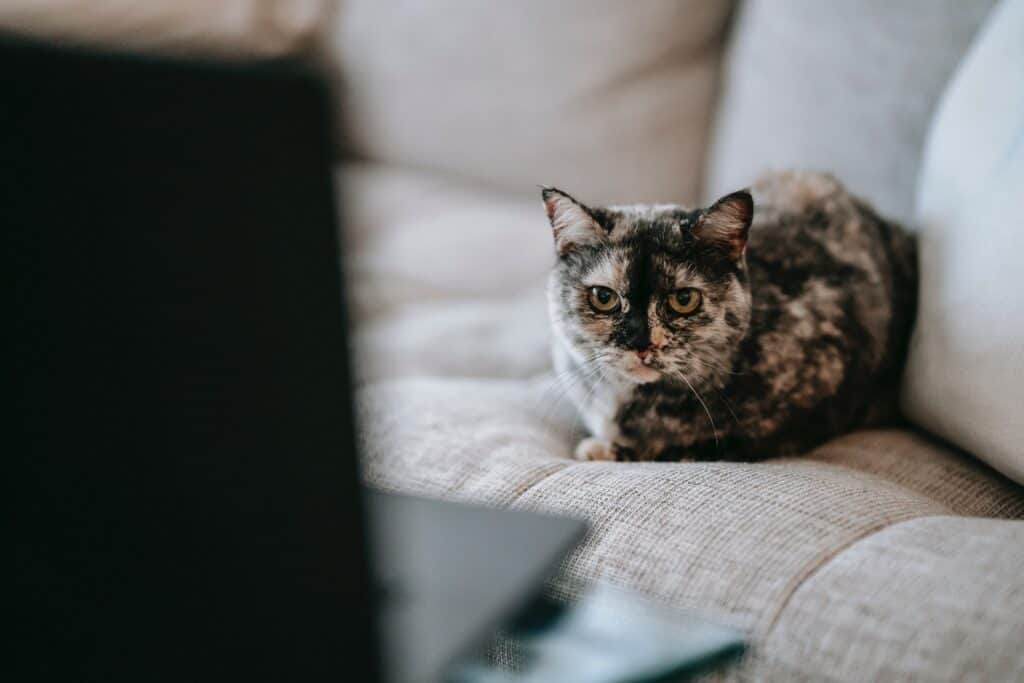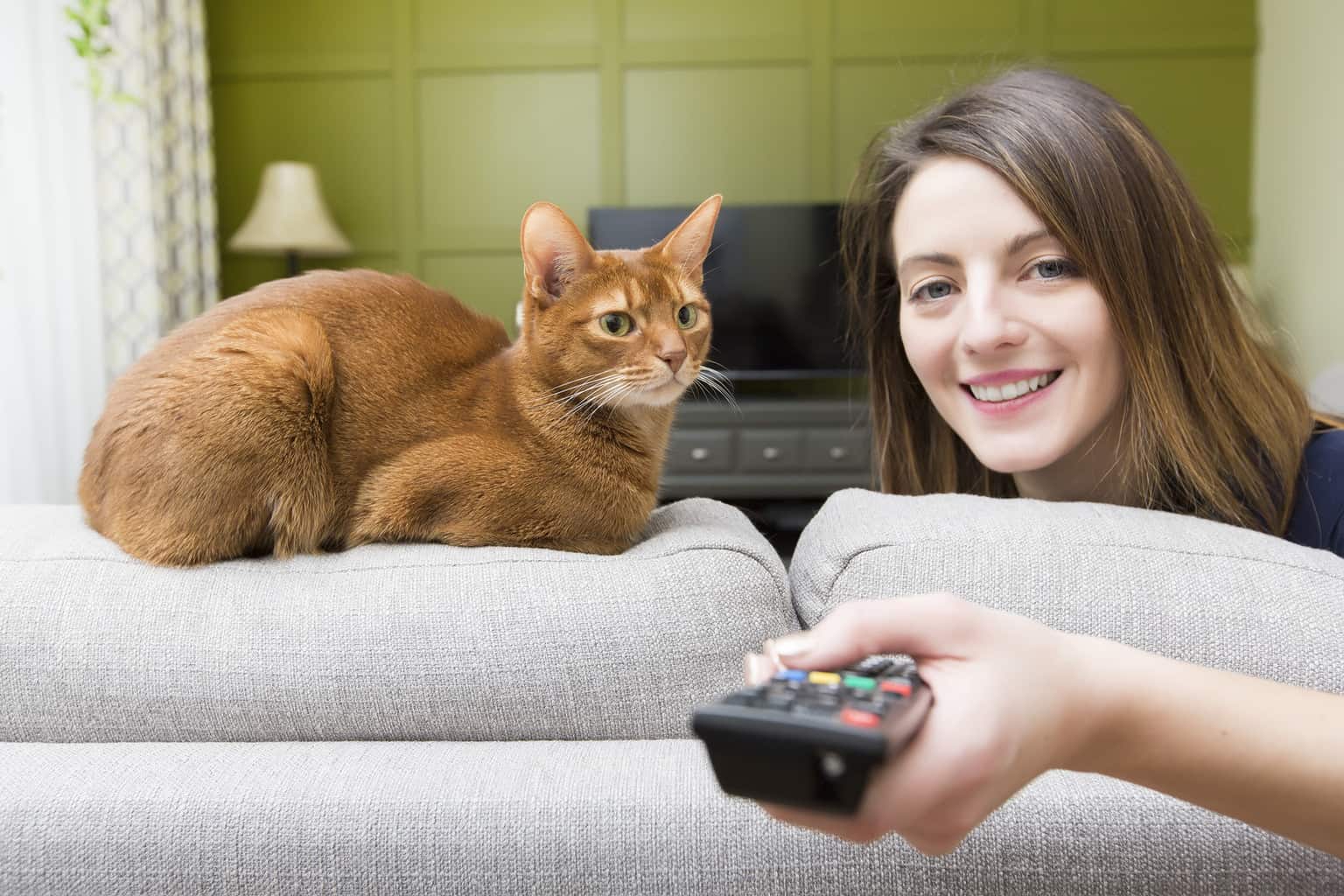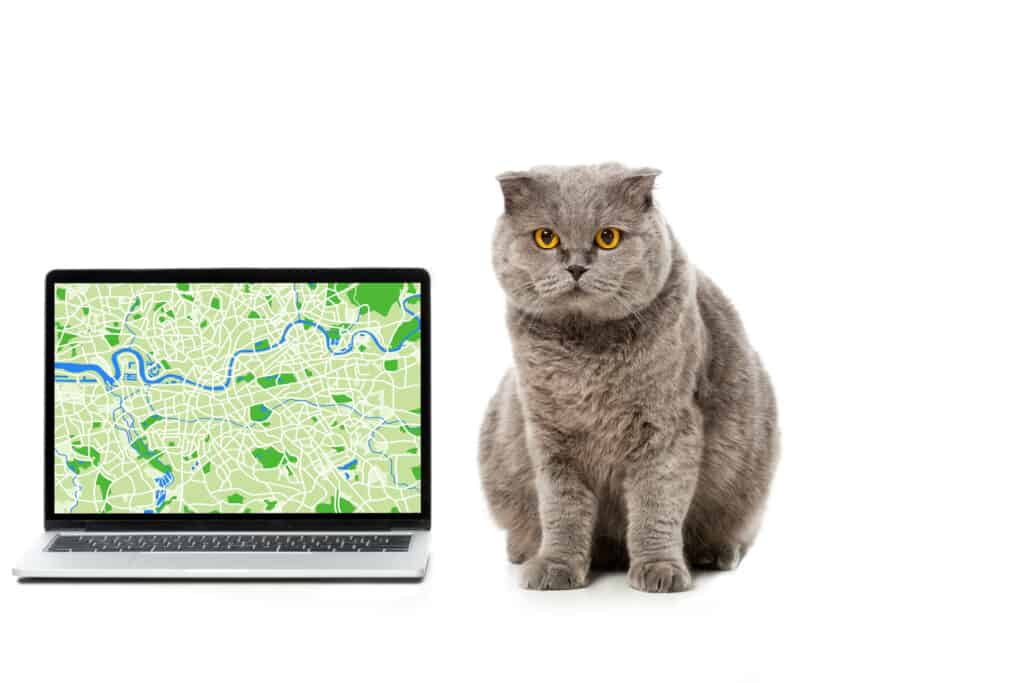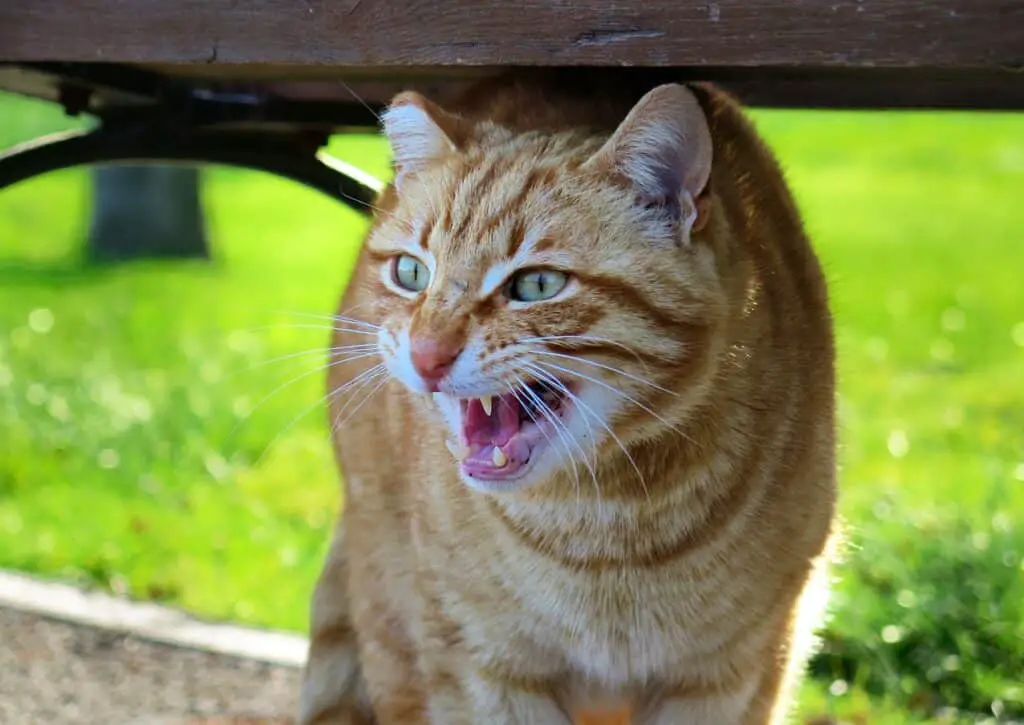Cats are naturally curious animals, so much so that we have a well-known idiom about that curiosity and the sometimes unfortunate consequences of it. They are also among the most interesting animals when it comes to personalities, and it can often be difficult to guess what they are thinking.
One particular behavior that many cats exhibit that has their owners scratching their heads is their keen interest in what is on the TV.
This leaves many cat parents thinking about whether our cats can really understand what is happening on the TV screen.
Cats like to watch TV because the sound and quick movements are intriguing to them. It is questionable if they understand what is being shown. Cats perceive sound and visual information differently than humans rely heavily on their strong sense of smell to understand their surroundings. It is often assumed that cats watch TV to mimic their owner and bond with them.
After all, they can’t possibly understand what is happening on the screen—unless they are considerably more intelligent than they have been letting us believe—and even if they could, why would they care what a bunch of humans are up to?
Do cats understand TV?
From a purely mechanical point of view, cats can watch TV. They see colorful and moving images, and some cats are triggered by the movement on the television screen.
Sure, they will not perceive the image the same way we do because a cat’s color perception is different compared to humans. They see colors less saturated than we do. Reds are almost completely absent in cat vision, and they may find it hard to focus on the TV, but nothing stops them from looking at the TV.
Cats may be engaged with what is happening on the screen, and as such, are watching the TV in a very practical sense. However, they simply do not have the mental capacity to understand what is going on. They see colors and movement, but they will not link the pictures on the screen with real-world things.
What do cats think when they watch TV? It’s impossible to say. We don’t know what they think when they stare for long minutes out of the window, either. But, if they are staring at your TV, it’s safe to say they are watching it and are interested enough by what they see to keep on staring.
How do cats perceive television?
It’s important to remember that our brains—that is, mammalian brains—are not some computer with a set number of inputs and outputs. It can help to think of your eyes as little cameras and your ears as microphones. Your brain is a computer that processes the data, but the reality is considerably more complicated.
How TV plays on a cat’s senses
What you have is a sensorium that is made up of all of your senses, and your brain builds a mental picture of the world around you based on what those senses are saying.
For example, you can often tell when someone is behind you, even though there are no visible signs that the person is there from your visual perspective. This is because your brain interprets changes in sound and pressure. But when it comes down to it, our vision is our most important sense.
Cats also have a complex sensorium, but their dominant sense is smell, not sight.
This has a significant effect on how cats perceive TV because while they may not understand that the big scary creature on the screen is not real, they will have a more profound sense of what is real through their sense of smell.
Of course, this doesn’t stop cats from occasionally being fooled by the screen, and there are plenty of videos of cats trying to attack something on the TV. But it’s important to remember that TV is an audio and visual experience, and a cat’s perception of the world is much more reliant on smell than ours.

What about sound?
Cats tend to have better hearing than humans, and they use this superior hearing to pinpoint the location of their prey.
For the most part, they will soon become accustomed to the TV and will not be too put off by the sound coming from that location.
It’s also worth remembering that the smell factor is still at play. They may hear birds tweeting from the TV, but they won’t smell them. To a cat’s perception, those birds on the TV are not real.
Cats prefer modern TV’s
As strange as it might sound, cats actually prefer newer TVs to old ones. Newer flat-screen TVs have a higher refresh rate, which gives a much more convincing illusion of movement, and as such, is more interesting to your furry friend.
Because cat brains process images faster than our human brains, the old-fashioned tube TVs that produce 50Hz images result in a non-sensical flickery image for cats.
This is because those old TVs redraw the picture on the screen 50 times per second. This is much too fast for our eyes to notice, so we experience it as a continuous image; for cats, that are not the case.
On the other hand, the modern flat-screen TVs have a refresh rate of 100Hz or more, which produces a much smoother and seamless picture, also for cats.
Bearing in mind that the lack of the right smells will already affect how interested your cat is in what’s on screen, an image that doesn’t look visually convincing will fail to grab your cat’s attention. You might have noticed that all of those hilarious videos of cats attacking a mouse on screen happen with a newer LCD screen.
What programs do cats like to watch?
Insofar as this question has any meaning, it’s worth thinking about what you’re asking. For example, would the question, “what do humans like to watch?” be an answerable question?
Of course, the answer is “no” — we’re all different, and what one person likes to watch might be entirely different from what another person likes to watch.
This is mainly down to our personality and interests, and as any cat owner will be able to attest, cats have plenty of personality of their own.
Your cat’s favorite programs? —if they like to watch TV at all— will largely depend on what they are interested in.
As a general rule, cats who enjoy watching TV are mostly engaged with programs that show plenty of movement. Even though cats don’t connect the images on the television with real-life events, they are intrigued by the movement.
TV programs for cats
The video below, 8-hour Bird Bonanza, shows various birds eating birdseed at a different outdoor locations. Because of the rapid movements and the sound of birds in the background, most cats will be fixated on it.
These television programs provide a lot of mental stimulation to cats, and most seem to enjoy it. If your cat seems to get frustrated by it, it’s best to turn it off.
Here is a similar video showing mice feasting on seeds.
Why do cats enjoy watching TV?
The need for mental stimulation is not unique to human beings. Cat owners will hopefully already know that their cats need a stimulating environment, which can often come in the form of toys, interesting outdoor areas to explore, and cozy time with their owners.
TVs fill this same purpose—a form of mental stimulation for your feline friend.
It’s worth remembering what we said earlier about sensoriums and how cats rely on their sense of smell. In other words, the TV is a source of stimulation for your cat, but it is far from adequate as their –only– source of stimulation.
Your cat could be copying you
One possibility for why your moggy is watching TV is probably not what you’d expect.
Against all evidence to the contrary, Cats are actually quite devoted pets and often do enjoy spending time with you.
If you find yourself sitting on the sofa watching TV and notice that your cat is sat there with you, they could be just mimicking you, trying to be involved with what you are doing.
It probably isn’t much consolation, but this is also why they insist on walking all over your keyboard when you’re trying to get some work done.
Another reason for your cat copying your behavior is that they see you as the pack leader. When cats live in groups, they’re often seen mimicking the actions of their leader.
Is watching TV bad for cats?
Like most things in life, TV is not inherently bad; it’s how TV is used that makes it bad. It is doubtful that your cat will be interested in just sitting and watching TV all day, but if that’s the case, then yes, it isn’t good for your cat.
Cats are built to be active—as are many animals, it is actively bad for their bodies just to lie around and lead a generally sedentary lifestyle. Most cat owners would probably find it more difficult to get their cat to sit in front of a TV rather than struggle to get them to stop watching it, but if you have a TV junkie feline, it’s probably best to get them up and about more.
On another note, if your cat sits extremely close to the TV when they watch it, this is bad for their eyes. They’re not going to develop serious sight issues because of it, but cats don’t understand things like eye strain, so you’ll have to look out for them in that regard.
Do cats like the TV left on when home alone?
Some cat owners leave the TV on for their kitty when left alone for a couple of hours. Whether or not your cat enjoys this basically comes down to their personality.
Some cats will enjoy the distraction of a TV playing in the background; others might get scared or agitated by the constant sounds and movement. I’d advise you to test it out and leave the TV playing while you leave the room for a while and see how your cat responds to it.
Generally, younger cats or those with a strong hunter’s instinct enjoy it more than cats that are mellow, older, and like their peace and quiet.
For cats coping with separation anxiety (common in, for example, Siamese cats), leaving the TV playing while you’re away might be beneficial to them.
Final thoughts
You probably didn’t need to read this post to know that cats are not having the same experience as you when they watch TV. But, just like us, every cat is different.
Some cats will attempt to chase a mouse on screen every time, while other cats might never show any sign of interest in your TV. Most cats will fall somewhere in between, however.
Just remember to take care of your cats. Some mental stimulation from watching TV can’t hurt your cat, but nothing beats some quality play-time with their owners.




